Tom Hanks opens up about his movies: From the ‘hooey’ to the ‘genuinely good’
The actor, who plays a villain for the first time in ‘Elvis’, has reflected on his 40-year-long career in a long interview with ‘The New York Times.’ This is what he said about some of his biggest films
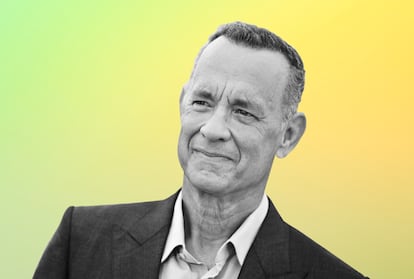
At the 2020 Golden Globes, actor Tom Hanks joked with the press about how he always plays the good guy in movies. “My current plan is, I’m about to go to Australia to work with Baz Luhrmann,” he said, in reference to the Australian director who had cast him in an Elvis Presley biopic. “The plan is, I’m playing Colonel Tom Parker, and silence all your stupid questions about why will I never play a bad guy.”
Two years later, ahead of Elvis’s theatrical release, Hanks confessed that Colonel Tom Parker is not all bad. “All you can say is that he’s wrong, not evil,” he said in an interview with The New York Times. It could be said that even when Tom Hanks plays the role of a manipulator, he brings out the most human side of the character, so that even a greedy talent manager can be relatable.
It’s what he’s been doing for most of his career. Compared to chameleon actors, he is an old-fashioned star, one of those celebrities where character and performer are indistinguishable. Hanks has often been compared to James Stewart, an actor who played the trusty neighbor who everyone could identify with. Both Hanks and Stewart represent the common man, the average citizen at his most idealistic and positive. The viewer identifies with them, they aspire to be like them.
In more cynical times, this squeaky-clean image is seen with a certain condescension. While their patriotism and nostalgia are viewed as reactionary and conservative. Being the ideal son-in-law and the perfect father seems less interesting than being an antihero.
But in times of moral crisis, the archetypes of “the good guy” and “the bad guy” have been subverted. Bill Cosby, the father of America, turned out to be a monster; Kevin Spacey, the character actor, a satyr. But Tom Hanks has a bombproof public image. There are no complaints about “inappropriate behavior” on set, no disgruntled colleagues criticizing him, no economic or moral scandals. He has been married to director Rita Wilson since 1988 and there has been nothing scandalous about their marriage beyond the fact that one of their four children is a little prone to conflict. It would seem that Hanks is, despite everything, just what he seems: a decent guy, a great actor who knows how to be humble and is self-deprecating at a time when honesty and integrity are not only desirable but subversive.
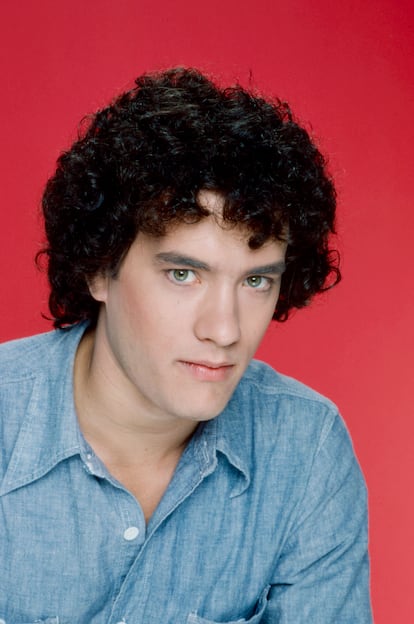
This career of milestones was built and defined little by little. Hanks started acting when he was very young and had not mastered the art, very much in the style of 1980s cinema. Today he is a flawless but realistic hero. Let’s review Tom Hanks’ career through some of his most iconic films and through his own words.
Bachelor Party (1984)
With a humility rarely seen in Hollywood, Hanks acknowledged that his first big hits would have been just as successful without him. “I can’t take credit for the success of Splash and Bachelor Party’s being hits, other than having been in the right place at the right time and having got the job,” he said in an interview in Playboy in 1989.
Big (1988)
Penny Marshall’s film about a 13-year-old boy who suddenly asks to become an adult and succeeds was his first critical and commercial success, it landed him his first Oscar nomination and confirmed him as a box-office star capable of leading ambitious projects (Harrison Ford and Robert De Niro had been considered for the part). At the time, he explained its appeal: “It’s a genuinely good movie that I think is really honest and touches the consciousness.”
The Bonfire of the Vanities (1990)
For the film adaptation of Tom Wolfe’s novel, Hanks’ character in The Bonfire of the Vanities was turned into a nice guy. The result was a fascinating fiasco that is still discussed in podcasts today. Hanks was not shy to criticize the film, or his role in it: “It’s one of the crappiest movies ever made!” he told Oprah Winfrey. “I was going contrary to everything about the character and even the screenplay, but I kept telling myself, ‘No, no, no – there’s a way I can get into this.’”
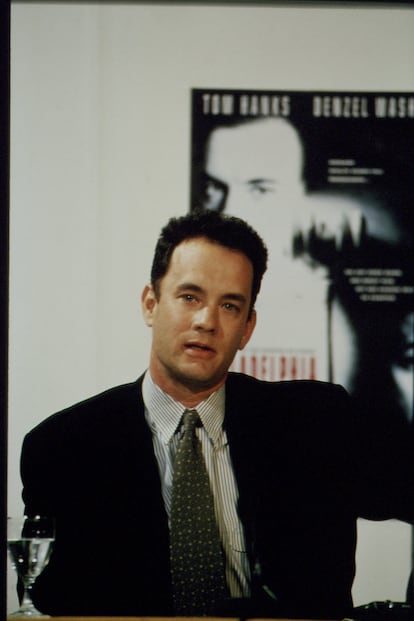
Philadelphia (1993)
Hanks got his first Oscar for playing a lawyer who was fired for having AIDS at a time when the disease carried tremendous social stigma. In the documentary The Celluloid Closet (1995), Tom Hanks spoke about the impact of the film on the perception of the disease: “My screen persona is pretty non-threatening,” he explained. “And because of that, this idea of a gay man with AIDS was not scary [...] partly because little Tommy Hanks is playing the role.” However, he recently told The New York Times that he wouldn’t take the same role today. “Could a straight man do what I did in Philadelphia now? No, and rightly so,” he told The New York Times. “The whole point of Philadelphia was don’t be afraid. One of the reasons people weren’t afraid of that movie is that I was playing a gay man. We’re beyond that now, and I don’t think people would accept the inauthenticity of a straight guy playing a gay guy.”
Forrest Gump (1994)
Forrest Gump was one of the highest-grossing films of its year and won numerous awards at the Oscars (Hanks took home his second award for Best Actor). But the movie also had many detractors, with critics calling it overly sentimental and far inferior to Pulp Fiction, its main competitor at the Oscars. This is how Hanks addresses the debate: “The problem with Forrest Gump is it made a billion dollars. If we’d just made a successful movie, Bob [Zemeckis, the director] and I would have been geniuses. But because we made a wildly successful movie, we were diabolical geniuses.
“Is it a bad problem to have? No, but there are books of the greatest movies of all time, and Forrest Gump doesn’t appear because, oh, it’s this sappy nostalgia fest. Every year there’s an article that goes, ‘The Movie That Should Have Won Best Picture’ and it’s always Pulp Fiction,” he says, which he calls “a masterpiece without a doubt.”
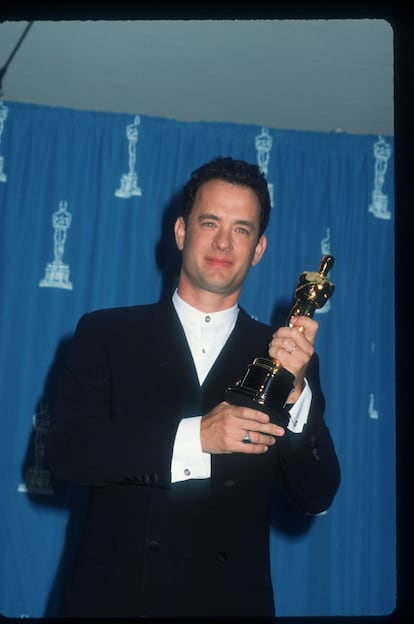
That Thing You Do! (1996)
Hanks’ directorial debut came from a script he wrote while promoting Philadelphia and Forrest Gump. “I had talked about myself for a year straight so I started writing to maintain some sort of creative sanity,” he told Deadline magazine. Years later, when he was asked his opinion about the film, he replied: “I love it.” Even though it wasn’t as well-received as his other movies, he defines it as the best filming experience of his life.
Saving Private Ryan (1998)
In Spielberg’s epic World War II movie, the director himself seemed to be conflicted about putting Hanks in morally gray situations, but the actor could not be dissuaded. “Steven Spielberg said, ‘I don’t think I want to see [Hanks’ character] John Miller fire his gun and kill Germans.’ I told him: ‘I’m sorry, Steven. You’re not going to get me all the way over here and turn me into some other guy just because you don’t want Tom Hanks to kill soldiers.’”
You’ve Got Mail (1998)
Nora Ephron, Tom Hanks and Meg Ryan reunited after the success of Sleepless in Seattle (1993) in a new version of The Shop Around the Corner, a 1940 film starring James Stewart. The comparison between Hanks and Stewart was not lost on the actor. “But I decided to disregard that concern,“ he said in an interview with Entertainment Weekly. “I mean, you’ll never see me remake Mr. Smith Goes to Washington or It’s a Wonderful Life. But Shop Around the Corner is very different. This is a very young Jimmy Stewart. This is Jimmy Stewart before Jimmy Stewart was Jimmy Stewart.”
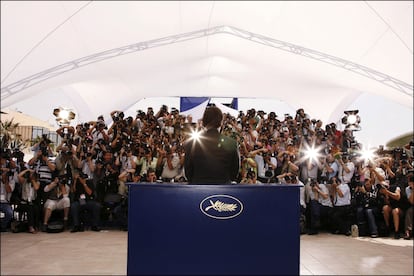
The Da Vinci Code (2006)
In the interview with The New York Times, Tom Hanks spoke honestly about The Da Vinci Code and its sequels Angels & Demons (2009) and Inferno (2016). “God, that was a commercial enterprise,” Hanks said. “Yeah, those Robert Langdon sequels are hooey. The Da Vinci Code was hooey.”
He continued: “Those are delightful scavenger hunts that are about as accurate to history as the James Bond movies are to espionage… All we were doing is promising a diversion.”
Hanks said that he has no problem with franchises, as long as they deliver at the box office. “There’s nothing wrong with good commerce, provided it is good commerce,” he said. “By the time we made the third [film, Inferno], we proved that it wasn’t such good commerce.”
“Let me tell you something else about The Da Vinci Code,” he added. “It was my 40th-something birthday. We were shooting in the Louvre at night. I changed my pants in front of the Mona Lisa! They brought me a birthday cake in the Grand Salon! Who gets to have that experience?”
Tu suscripción se está usando en otro dispositivo
¿Quieres añadir otro usuario a tu suscripción?
Si continúas leyendo en este dispositivo, no se podrá leer en el otro.
FlechaTu suscripción se está usando en otro dispositivo y solo puedes acceder a EL PAÍS desde un dispositivo a la vez.
Si quieres compartir tu cuenta, cambia tu suscripción a la modalidad Premium, así podrás añadir otro usuario. Cada uno accederá con su propia cuenta de email, lo que os permitirá personalizar vuestra experiencia en EL PAÍS.
¿Tienes una suscripción de empresa? Accede aquí para contratar más cuentas.
En el caso de no saber quién está usando tu cuenta, te recomendamos cambiar tu contraseña aquí.
Si decides continuar compartiendo tu cuenta, este mensaje se mostrará en tu dispositivo y en el de la otra persona que está usando tu cuenta de forma indefinida, afectando a tu experiencia de lectura. Puedes consultar aquí los términos y condiciones de la suscripción digital.








































